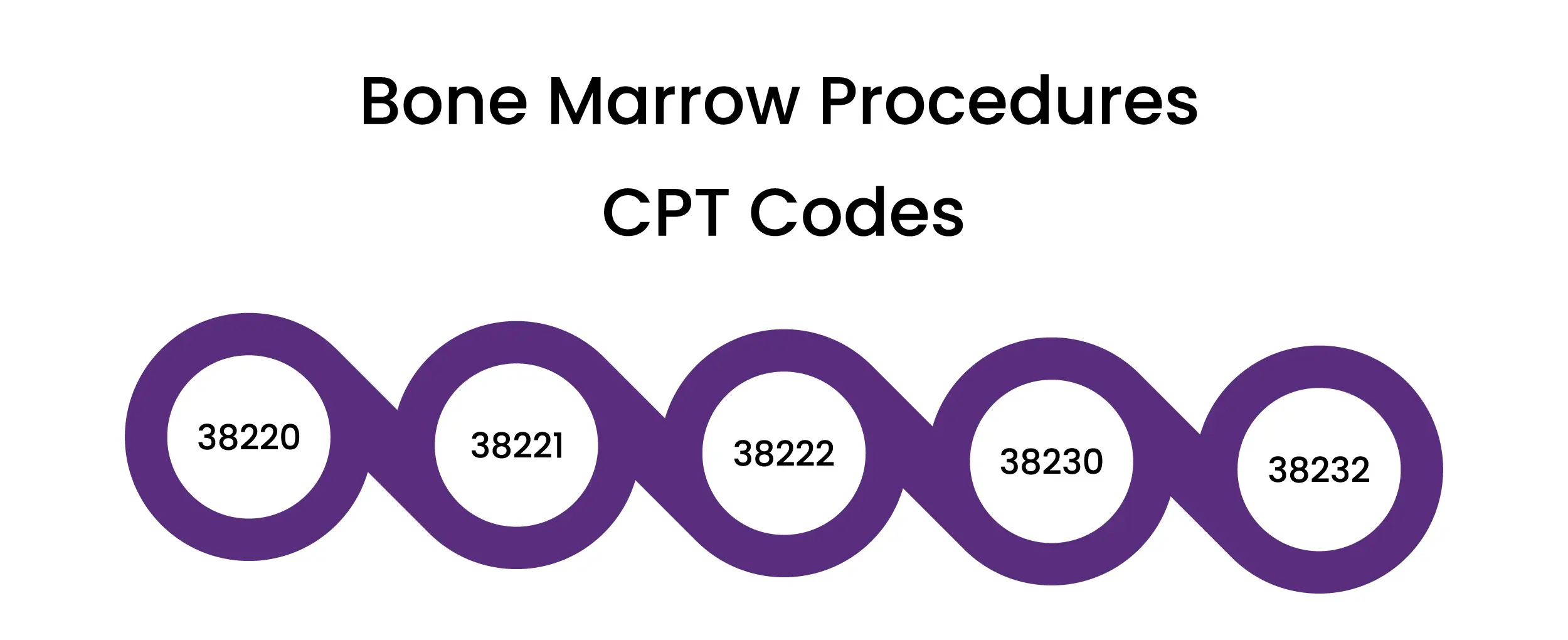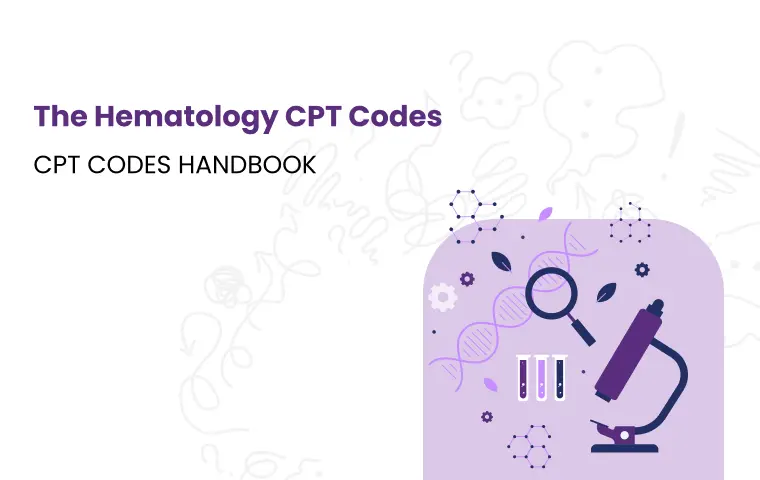Hematology, the study of blood and blood-forming tissues, is a critical medical specialty encompassing many conditions, from common anemias to complex blood cancers. Hematologists diagnose and treat these disorders through various procedures, including blood tests, bone marrow biopsies, transfusions, and specialized therapies.
Translating these essential services into accurate medical claims requires a deep understanding of hematology-specific Current Procedural Terminology (CPT) codes. This guide is a comprehensive resource for healthcare providers and medical coders, diving into the essential CPT codes used in hematology practice. We'll cover everything from routine blood tests to specialized procedures.
Some Common Hematology CPT Code Categories
Let's break down some of the most common CPT code categories you'll encounter in hematology billing. These codes cover a wide range of services, from routine lab work to specialized procedures.
Laboratory Tests
Hematologists rely on a wide array of tests to assess blood cell counts coagulation factors, and detect underlying genetic abnormalities.
Complete Blood Count (CBC)
The CBC is a fundamental hematology test that evaluates the quantity and quality of various blood cells. Several CPT codes are associated with the CBC, depending on the level of detail and additional components:
CPT 85002: This code represents a microscopic examination of a blood smear made from a finger stick or venipuncture. The healthcare provider examines the smear under a microscope to assess the number, size, and shape of red blood cells, white blood cells, and platelets. This test can help diagnose various conditions, including anemia, infections, and blood cancers.
CPT 85004: This code describes a qualitative platelet count performed on a blood smear. This involves estimating the number of platelets in the blood. Platelets are essential for blood clotting, and an abnormal platelet count could indicate a bleeding disorder or bone marrow problem
CPT 85025: This code covers a basic CBC, including a white blood cell count, red blood cell count, hemoglobin, hematocrit, mean corpuscular volume (MCV), mean corpuscular hemoglobin (MCH), mean corpuscular hemoglobin concentration (MCHC), and platelet count.
CPT 85027: This code encompasses a more comprehensive CBC with automated differential, which provides a detailed breakdown of the different types of white blood cells (neutrophils, lymphocytes, monocytes, eosinophils, basophils).
CPT 85048: This code is used for a CBC with manual differential, where a technician visually examines the blood smear to identify and count white blood cells, offering a more accurate assessment in certain cases.
Coagulation Studies
These tests assess the blood's ability to clot properly, which is essential for preventing excessive bleeding or clotting. Common coagulation tests include:
-
Prothrombin Time (PT): CPT 85610
-
Partial Thromboplastin Time (PTT): CPT 85730
-
International Normalized Ratio (INR): Included with PT (85610)
Bone Marrow Procedures
Bone marrow procedures are essential diagnostic and therapeutic tools in hematology. They offer valuable insights into the production of blood cells and are vital for diagnosing and monitoring conditions like leukemia, lymphoma, and other blood disorders.

Bone Marrow Aspiration: This procedure involves collecting a liquid sample of bone marrow to examine the types and numbers of cells present.
-
CPT 38220: This code encompasses bone marrow aspiration, including any number of aspirations performed during the procedure. It includes preparing the site, collecting the aspirate, and preparing the specimen for analysis.
Bone Marrow Biopsy: A bone marrow biopsy involves removing a small, solid piece of bone marrow tissue for microscopic examination. This provides a more comprehensive view of the bone marrow structure and cellularity.
-
CPT 38221: This code represents a percutaneous needle biopsy of the bone marrow.
-
CPT 38222: This code combines both bone marrow aspiration and biopsy when performed together during the same session.
Bone Marrow Harvest: This procedure involves collecting a larger amount of bone marrow for transplantation purposes.
-
CPT 38230: This code covers the collection of bone marrow from the posterior iliac crest, the most common site for harvesting.
-
CPT 38232: This code is used when bone marrow is harvested from multiple sites during the same session.
Transfusions and Infusions
Transfusions and infusions play a vital role in hematology, providing patients with essential blood components, medications, and fluids to manage a variety of conditions.
Blood Transfusions: These are a mainstay of hematology treatment, replenishing lost blood components or providing specific factors to patients with deficiencies.
-
CPT 36430: This code encompasses the transfusion of blood or blood components, regardless of the specific component (red blood cells, platelets, plasma, etc.) or the volume transfused.
-
Additional Notes: While CPT 36430 is the most commonly used code for transfusions, there may be specific codes for certain specialized blood products or procedures. Always consult the latest CPT codebook and payer guidelines for the most accurate coding.
Therapeutic Phlebotomy: This procedure involves the removal of a specific volume of blood to treat conditions like hemochromatosis (excess iron) or polycythemia vera (excess red blood cells).
-
CPT 36470: This code covers therapeutic phlebotomy, including the venipuncture and withdrawal of blood.
Chemotherapy Administration: In hematology-oncology, chemotherapy infusions are often used to treat blood cancers and other malignancies.
-
CPT 96413: This code is for the first hour of chemotherapy administration, including hydration and pre-medication.
-
CPT 96415: This code is used for each additional hour of chemotherapy infusion.
-
Additional Notes: Chemotherapy coding can be complex, with specific codes for different drug regimens and administration methods. Always verify the correct codes based on the specific treatment plan.
Other Infusions: Hematology may also involve the infusion of other therapeutic agents, such as intravenous iron (CPT 96372) or intravenous immunoglobulin (IVIG) (CPT 96365, 96366). Be sure to consult the latest CPT codebook for the appropriate codes based on the specific substance being infused.
Ending Notes
Understanding and correctly applying hematology CPT codes is a continuous journey of learning and adaptation. The field constantly evolves, with new treatments, technologies, and coding guidelines emerging regularly. By staying informed and embracing the complexities of hematology coding, you can ensure that your practice receives accurate reimbursement for the critical services you provide to patients.
For comprehensive support in managing the complexities of hematology medical billing, consider partnering with a specialized billing service. Hematology Billing Services provided by HMS USA LLC can help you streamline your billing processes, reduce errors, and maximize revenue.
ABOUT AUTHOR

John Wick
As a blog writer with years of experience in the healthcare industry, I have got what it takes to write well-researched content that adds value for the audience. I am a curious individual by nature, driven by passion and I translate that into my writings. I aspire to be among the leading content writers in the world.
